The importance of finding community beyond my Pompe tribe
How a Miami Dolphins fan club helps this columnist find balance in life
Written by |
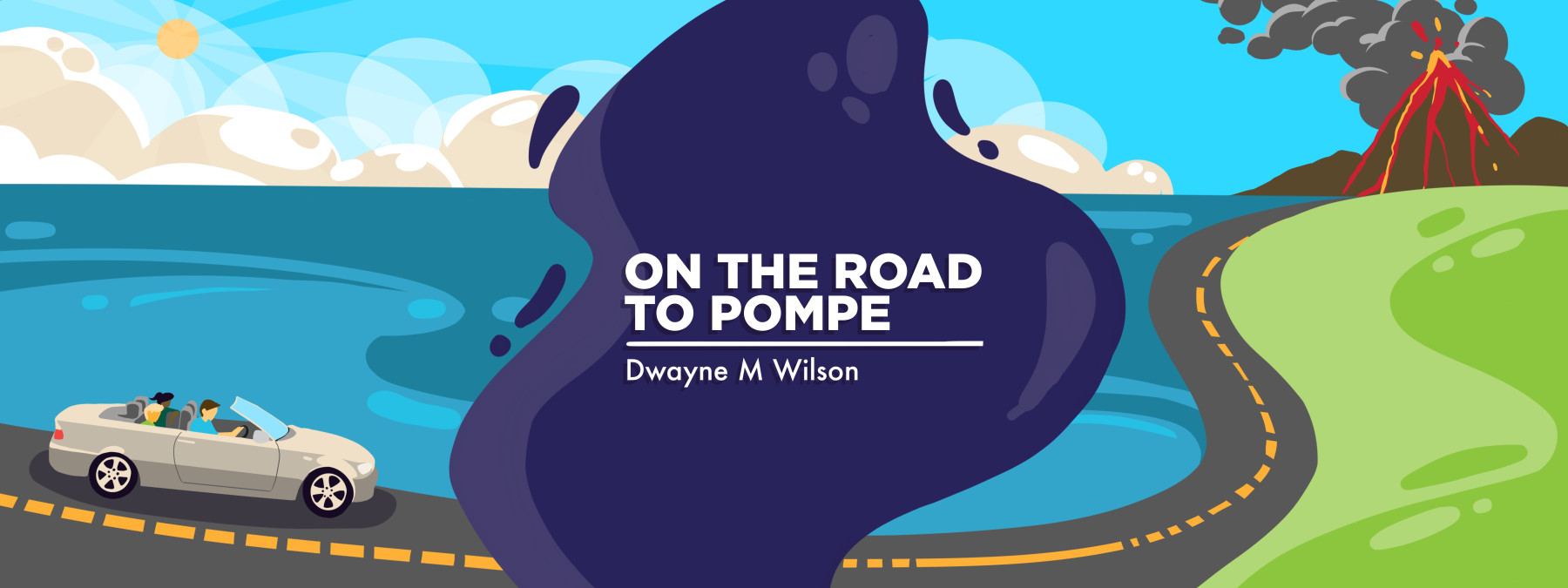
When I was diagnosed with late-onset Pompe disease in 2018, I didn’t know what my life would look like moving forward. When I was told the disease had no cure, my mind went into a tailspin, taking me down into a deep, dark place.
However, my doctor then explained that there was a treatment that could help slow disease progression. It felt like I’d been drowning in the deep end of a pool, and someone had stuck out an IV pole for me to grab. Enzyme replacement therapy was my life preserver, my ticket out of the water.
Although a weight had been lifted off my shoulders, I felt alone. No one really knows what it’s like to be unable to climb a flight of stairs, carry a box, or lift something up from the ground, despite looking like a giant football player. I couldn’t even stand up from a chair using just the strength in my legs. It’s embarrassing at times, especially in public.
Then I found my Pompe tribe though support groups on Facebook. I started connecting with other patients and learning about their experiences with this disease. However, having this new tribe felt like I was closing the door on other opportunities and possibilities. I had blinders on as I focused on staying in my Pompe bubble and keeping others out. I realized that I needed to find a balance between Pompe and other aspects of my life.
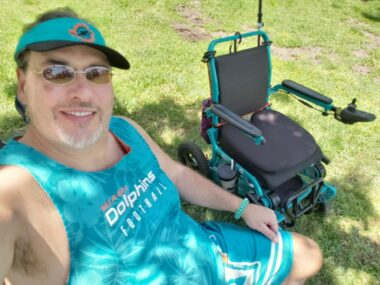
Dwayne and the Dolphinator relax in the shade at Glen Helen Regional Park in San Bernardino, California. (Photo by Dwayne Wilson)
Connecting with my fellow Dolfans
I found that balance with my “Dolfans,” “Finlaws, and “Phamily” from the Fins Up So Cal Fan Club here in Southern California. I have been a Miami Dolphins fan since 1981, when I was a teenager learning the game of football.
I went to a few games at Jack Murphy Stadium in San Diego in 1984 and 1993, a game in Anaheim, California, in 1986, and a playoff game in Seattle in 1999. I have cheered on the Dolphins every year. My electric wheelchair is decked out in the team’s colors, aqua and orange, and everyone knows I call it the “Dolphinator.”
When I moved back to Southern California in 2017, I found the Dolphins fan club on Facebook. They host watch parties every Sunday during football season and have raffles, toy drives, and contests to support local charities. We all cheer on our favorite team in a fun family atmosphere.
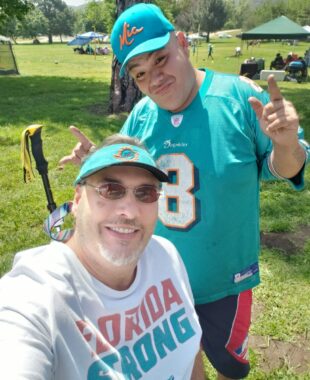
Dwayne and his good friend Louie hang out at the Fins Up So Cal Fan Club’s 10th annual picnic in San Bernardino. (Photo by Dwayne Wilson)
Last weekend, the fan club held its 10th annual picnic and barbecue at the Glen Helen Regional Park in San Bernardino, California. The club is organized by Jason Miller, Grace Hernandez, and some other incredible admins. Their hard work and dedication make this such an enjoyable event, with Dolfans coming out from Northern California, Seattle, Arizona, Colorado, and even Florida.
The fan club is where I met my good friend Louie Reyes, whom I wrote about in a previous column. He was the one who inspired me to step outside my comfort zone and take a guys’ trip to San Jose, California, last December, where we saw the Dolphins play the San Francisco 49ers.
Then there’s Marc Angelo, president of the NorCal Dolfan Club. He’s always on a mission to fundraise for Dolphins Challenge Cancer, and he supports the Dan Marino Foundation, which aims to empower people with autism. He is an inspiration to others and is making a difference in this world. Marc was named the Miami Dolphins Fan of the Year in 2021. He got to attend the Super Bowl that season to represent Dolfans, along with his amazing wife, Rusty.
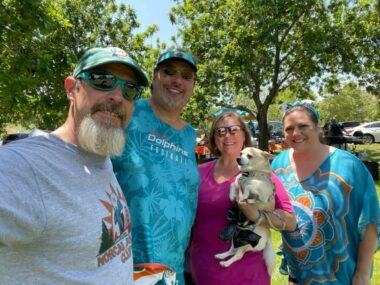
From left, Marc Angelo, Dwayne Wilson, Dwayne’s wife, Jean, who’s holding their dog, Guido, and Marc’s wife, Rusty, enjoy time together at the 10th annual Fins Up So Cal Fan Club picnic in San Bernardino. (Courtesy of Dwayne Wilson)
Marc has always encouraged and supported me on my journey with Pompe. He tells me to keep “smashing Pompe,” reminds me that there will be a cure one day, and encourages me to never give up hope and keep fighting the battle.
Having all these Miami Dolphins friends outside of my Pompe community has helped me to find balance, improve my mental health, and keep my life fun and exciting. I enjoy doing things with both tribes, and that keeps me moving forward “On the Road to Pompe.”
Have you found balance in communities unrelated to Pompe? Please share in the comments below.
Note: Pompe Disease News is strictly a news and information website about the disease. It does not provide medical advice, diagnosis, or treatment. This content is not intended to be a substitute for professional medical advice, diagnosis, or treatment. Always seek the advice of your physician or other qualified health provider with any questions you may have regarding a medical condition. Never disregard professional medical advice or delay in seeking it because of something you have read on this website. The opinions expressed in this column are not those of Pompe Disease News or its parent company, Bionews, and are intended to spark discussion about issues pertaining to Pompe disease.


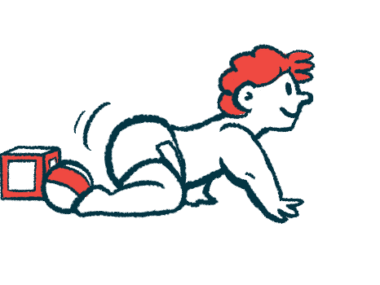

Monique Griffin
The use of tribe in this manner is considered cultural appropriation and many Native Americans find it offensive or degrading. If we are
going to advocate and raise awareness for Pompe Disease we should not to so by ignoring the feelings of another marginalized group. Here is a link to a short article that explains the reasoning nicely. Let me know if you have any questions, I work with a number of people who are Native Americans who, I’m sure would be happy to elaborate further. No shame, just educating - which is what we are all trying to do right?
https://matadornetwork.com/read/indigenous-language-stop-appropriating/
Sal Trentacoste
How do you know if ERT is helping you. I have just begun to use enzyme replacement therapy. I was very excited about this life line & couldn't wait for the help. Ending up in a wheelchair & on a ventilator seemed like a death warrant. I felt no change after the first four sessions & so I had blood work drawn to see where I stood with my CPK readings. I was hoping the readings would come down a bit which would prove to me that there was progress. The last CPK reading I had was approx. 5 months ago & it was 650, this latest reading was 825. How could it get worse? My rheumatologist told me it would not help, was he right?